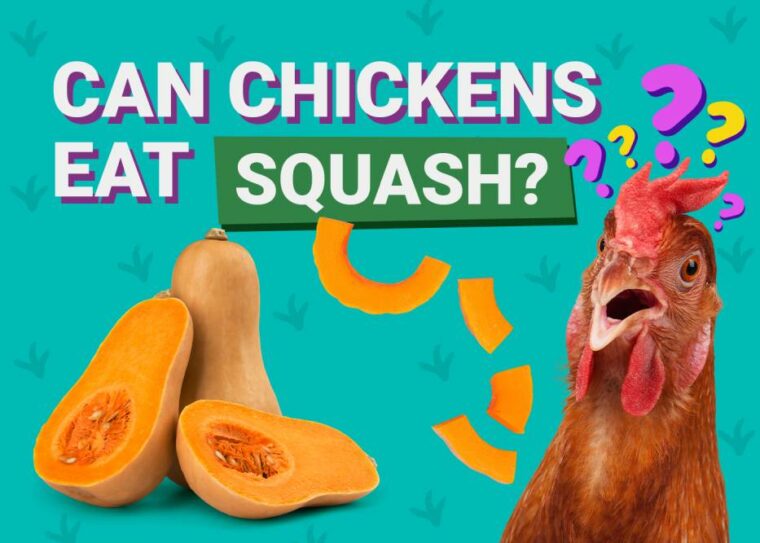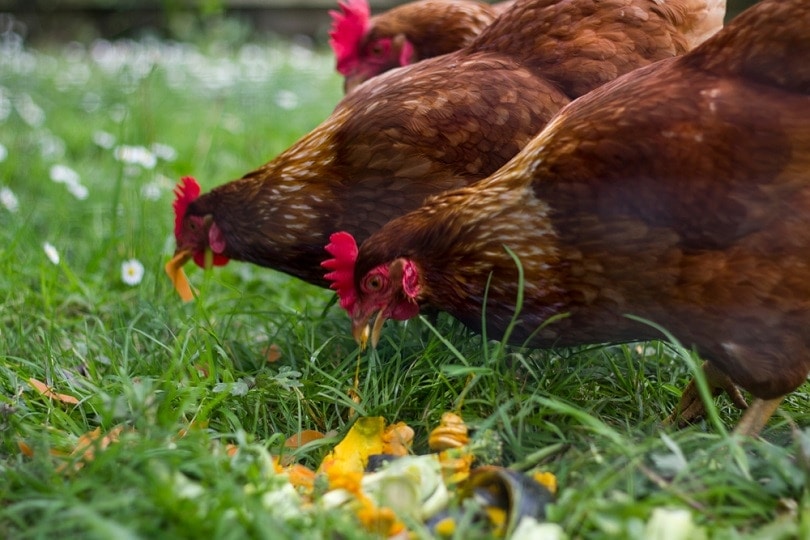
Click to Skip Ahead
Especially towards the end of autumn, there seems to be a decorative squash of some kind everywhere you look. Perhaps you’ve wondered if they could be repurposed as scraps for your backyard chooks once they’ve served their purpose as decor. Logically, you would have also wondered whether your feathered friends can even eat squash.
The good news is—of course chickens can eat squash! It’s tasty, nutritious, and even offers a few additional health benefits. So, provided your Halloween pumpkins have not begun to decompose and are free of mold, you should definitely upcycle them and serve them up to your chickens as a tasty treat!
What Kinds of Squash Can Chickens Eat?
Your Halloween gourd is just one of the huge number of squashes that you could (and should) be offering up to your backyard buddies. In fact, many others in this enormous family of fruits (fun fact: they are a fruit, not a vegetable!) are more palatable and likely to get their feathers ruffled in culinary excitement!
You might be wondering just how enormous this family is. Squashes encompass all the species of the Cucurbitaceae family of fruits, which consist of over 900 members! This family includes delectable favorites, such as watermelon, butternut, pumpkins, honeydews, cucumbers, zucchini, and the list goes on.
The good news? Your chooks can snack on every single kind of edible squash known to man with gay abandon! Every part of the squash is edible: the skin, seeds and flesh; and it is equally so, either raw or cooked.

Squash Nutritional Value
Each squash variety has a different nutritional breakdown, but they are all incredibly healthy, boasting multiple nutritional benefits. They are high in vitamins B and A, and particularly vitamin C, while also boasting high levels of antioxidants, polyphenols and beta-carotene. They also are rich in important minerals such as phosphorus, potassium, magnesium, and manganese. Additionally, they are a great source of fiber and a water-rich source of hydration.
Other Health Benefits
Research has shown that the seeds of pumpkin and winter squash reduced worm load in goats,1 and the seeds of summer squash did the same in mice. There is plenty of other evidence that pumpkin and butternut seeds effectively inhibit parasite activity in humans and other animals, such as dogs and cats—so it is reasonable to conclude that they have a similar effect on poultry.
The seeds from the Cucurbitaceae family have been used for hundreds of years as a natural and effective anthelmintic—for both humans and their livestock. Many chicken keepers even suggest feeding pumpkin and butternut squash seeds to prevent the build-up of internal parasites.
When parasite loads become too high, animals’ health can be negatively affected and may even result in death. Therefore, it’s important to keep an eye on your chickens for any signs of worm activity. Although no research has been done on chickens specifically, it is possible that regularly supplementing with squash seeds may help prevent worm infestations from occurring.
Things to Be Mindful Of
There are a few minor cautions to bear in mind when feeding chickens squash. For instance, most pumpkins, like those used for Halloween, are of a more mature, tougher-skinned variety. Though unlikely, your chooks may have difficulty with the tough skin and may damage their beaks trying to eat it. If you’re worried about the skin being too tough, either remove it or cook it before offering it to your avian buddies.
Be aware of offering over-ripe squash too. Ensure that it has not begun to rot or grow mold. If it has, then it’s best to avoid the risk and toss it.
When offering cooked squash to your chooks—especially your dinner leftovers—consider first whether it has been prepared with seasoning, spices, and sugar that won’t be healthy for your chickens.
What Else Should I Be Feeding My Chickens?
Chickens are omnivores and they need a great variety in their diet. When left to their own devices, they will try anything in their environment that might resemble a tasty morsel. For this reason, they’ll love you forever if you make their nosh as interesting and varied as possible.
Always include fresh, unprocessed, and whole foods with plenty of squash in the mix! Their diet should also be supplemented with good quality commercial chicken feed. There are plenty available that are formulated for the exact growth phase of the chook.

What Should I Avoid Feeding My Chickens?
Having established that squash is definitely a thumbs up, bear in mind there are certain foods that may be bad choices for your chicken friends.
Watch out for moldy scraps and any foods that have been treated with herbicides or pesticides—food you’d probably be staying away from yourself. Also, as mentioned, foods originally prepared for humans may contain excessive amounts of salt, sugar, and spices—all of which are not great for chickens.
Conclusion
In conclusion, squash in all its glorious forms is a resoundingly healthy choice for your beloved chooks. It has an exceptionally high nutritional value, as well as offering other health benefits such as potential anthelmintic properties. Just be mindful not to feed them squash that’s too hard for their delicate beaks, or that is no longer consumable.









